Key takeaways:
- Wills are essential for providing clarity and reducing conflict among family members after a person’s death.
- Researching wills offers insights into family histories, values, and relationships, revealing emotional connections beyond legal documents.
- Online databases, local archives, and genealogy societies are valuable resources for accessing historical wills and estate records.
- Interpreting wills requires understanding legal terminology and context, as well as looking for personal notes that enrich the narrative of family dynamics.
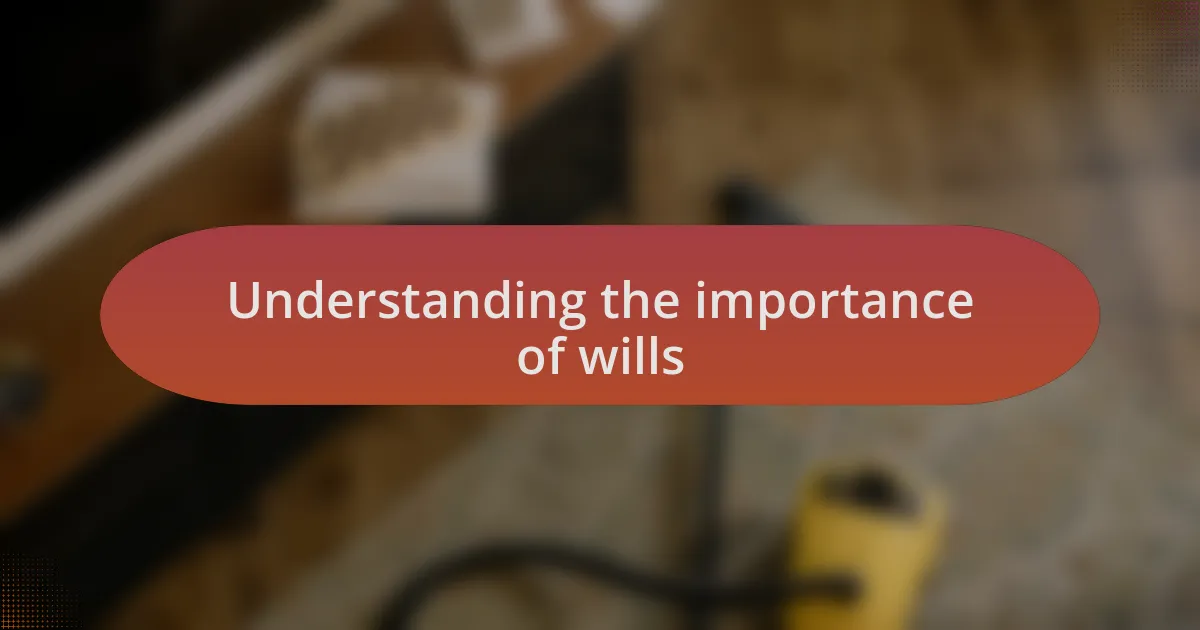
Understanding the importance of wills
Wills serve as a crucial roadmap for one’s legacy, guiding how assets are distributed after death. I remember when my grandmother passed away; her will made a potentially messy family situation much smoother. It gave us clarity during an emotionally charged time, showing just how vital wills can be in reducing conflict among loved ones.
Have you ever paused to think about the heavy burden that falls on loved ones when there’s no will to guide them? In my own experience, witnessing friends navigate the chaos of an estate without a clear plan left an indelible mark on me. The stress and uncertainty can feel overwhelming, emphasizing that a well-drafted will is more than just a legal document—it’s a gift of peace for those left behind.
Moreover, considered planning in a will can honor a person’s wishes while simultaneously safeguarding family dynamics. I recall learning about a family where a lack of will led to sibling rivalries that lingered for years. It highlighted to me that wills do more than allocate possessions; they preserve relationships and honor life’s legacies in a way that resonates profoundly with those we leave behind.
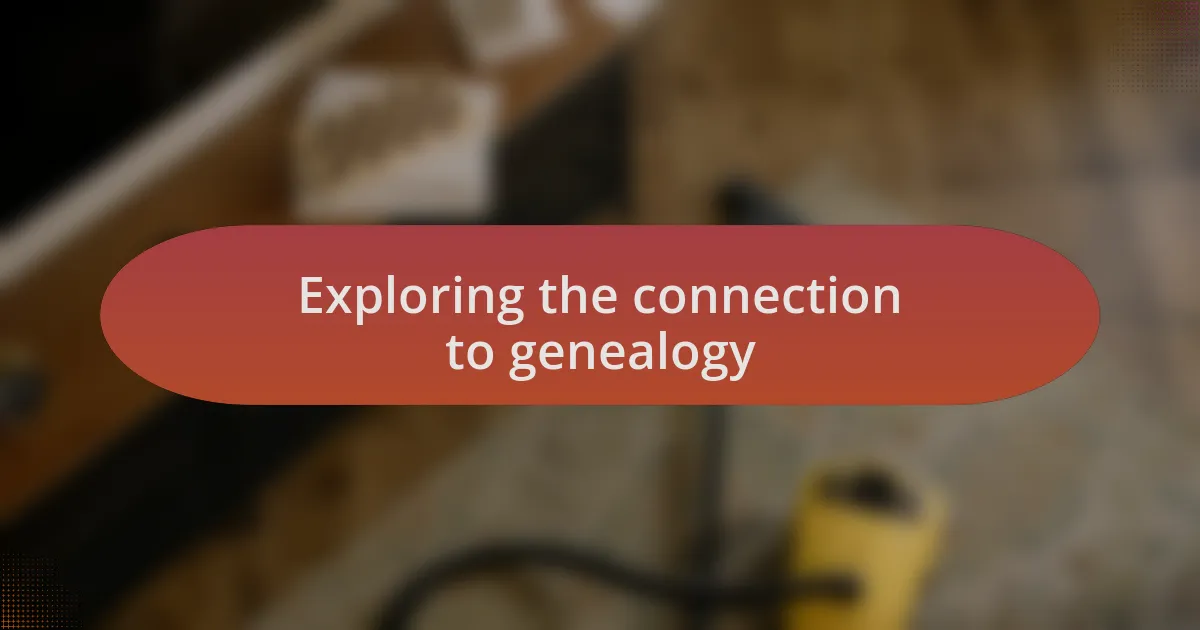
Exploring the connection to genealogy
Exploring family history often reveals how our ancestors handled their legacies, and this is where the connection to genealogy becomes strikingly clear. During my research, I stumbled across an old will from the 1800s, which outlined not just assets but also familial relationships. It was fascinating to see how names I had only read about in family trees were suddenly brought to life through the tangible decisions my ancestor had made.
As I delved into these documents, I couldn’t help but wonder: how many family stories have been lost due to a lack of clear guidance in the past? One particular discovery left a lasting impression on me. I found a will that highlighted a cherished family heirloom passed down through generations. The emotional weight of that object, now tied to a specific ancestor’s wishes, resonated deeply with me and underscored how linked our genealogical narratives are to these legal documents.
Furthermore, examining wills not only reveals who our ancestors were but also sheds light on their values and priorities. For instance, I rediscovered the significance of charity in my family’s history through bequests made in various wills. This connection between personal stories and legal documents opens up a broader understanding of our lineage. Have you ever considered how your family’s values are echoed in the choices laid out in their wills?
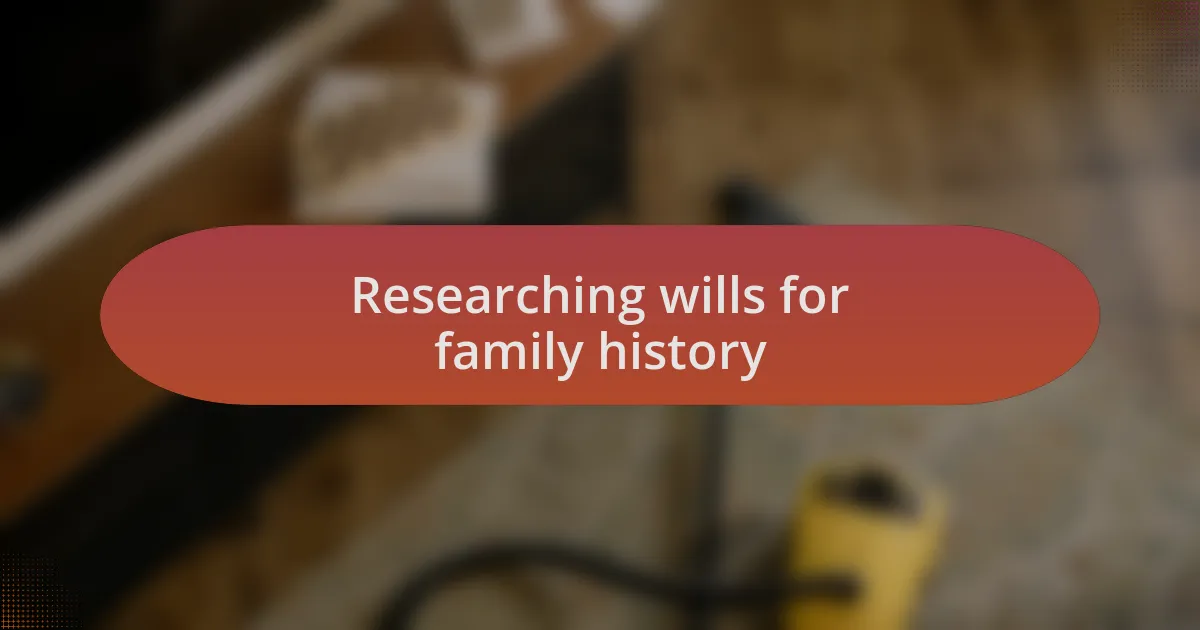
Researching wills for family history
Researching wills can reveal unexpected layers of our family histories that go beyond mere names and dates. I vividly recall uncovering a will from the early 1900s that detailed not just property but also a heartfelt letter to the family. That letter spoke of love, dreams, and aspirations—personal insights that left me feeling connected to a relative I never met. Have you thought about how a simple piece of paper could bridge the gap between generations?
As I sifted through various wills, I found evidence of long-lost relationships. One document included a distant relative I had only heard about in whispers, leading me to wonder how their choices shaped subsequent generations. This experience reminded me that every detail matters; even the way possessions were distributed can illuminate family dynamics. Have you ever had a similar revelation that changed your perspective on your family tree?
Additionally, the wills I examined illuminated traditions and practices that had faded with time. I discovered a provision for a special family gathering marked in one will, sparking my curiosity about how our ancestors celebrated their legacies. These moments, lost in the shuffle of time, can now be revitalized through our research. How has your exploration of family practices through legal documents reshaped your understanding of your heritage?
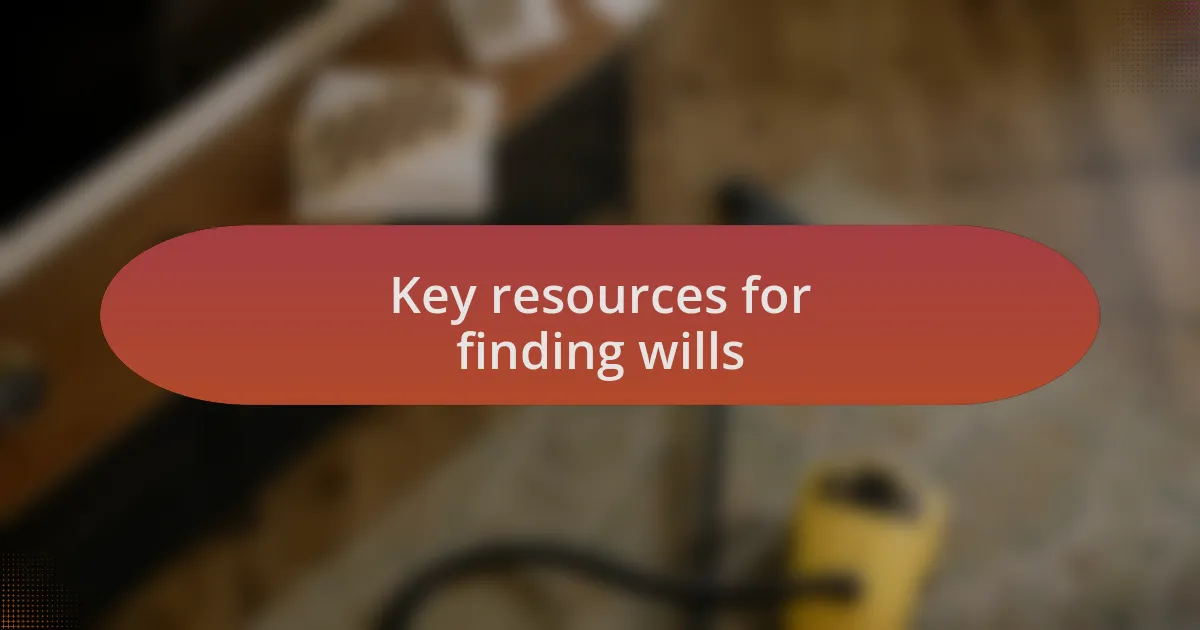
Key resources for finding wills
When searching for wills, online databases can be invaluable. Websites like Ancestry.com and FindAGrave provide access to a plethora of estate records, allowing you to sift through historical documents from your own home. I remember the thrill of typing in my family’s surname and finding a digital copy of a will that revealed names I had never encountered before. Online platforms often have indexes that make it easier to navigate through extensive archives—have you explored them yet?
Local courthouses and archives are also essential resources for digging deeper into estate records. I once visited a county clerk’s office where the staff were not only helpful but excited to share additional resources that weren’t available online. I discovered a ledger that documented the distribution of assets and read notes that provided a glimpse into my ancestors’ lives. The personal attention often found in these local settings can unveil treasures—what might you uncover during your own visit?
Finally, joining genealogy societies can open doors to shared knowledge and local expertise. When I became a member of a local history group, I connected with seasoned researchers who guided me in accessing obscure records that I hadn’t considered. This community not only helped refine my search techniques but also inspired me to dig deeper into my family’s backstory. Have you ever thought about how collaboration can accelerate your research journey?
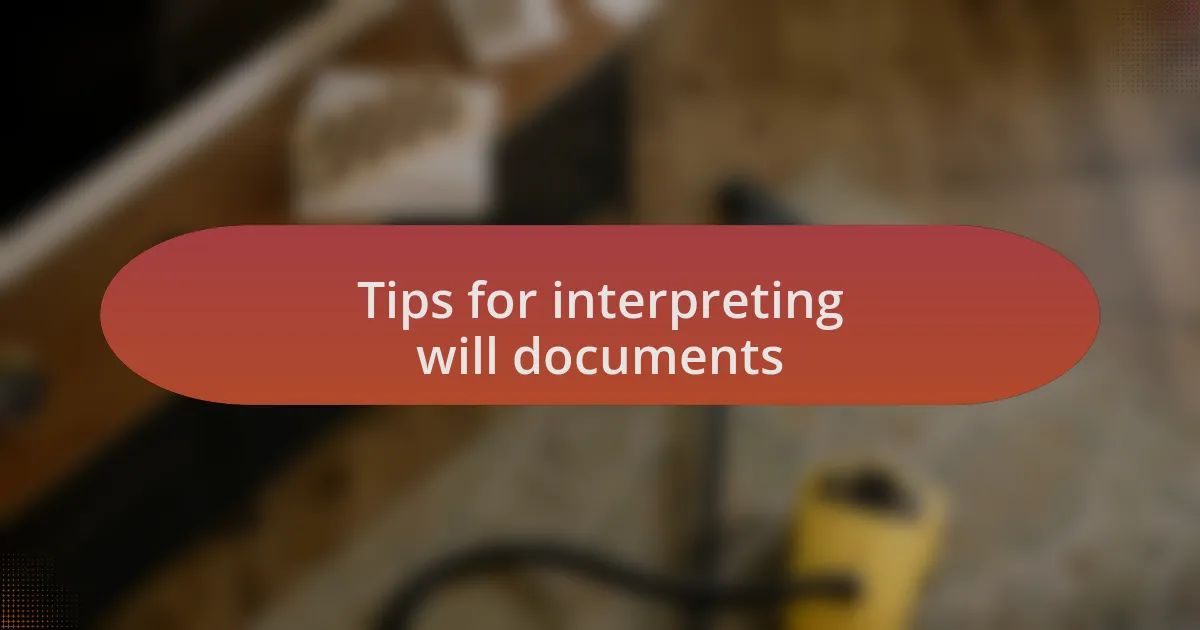
Tips for interpreting will documents
When interpreting will documents, it’s essential to familiarize yourself with the legal terminology often used. Terms like “testator” (the person who made the will) and “bequest” (a gift of personal property) can feel daunting at first. I recall my initial confusion over phrases in my great-grandmother’s will, which made me realize that a little research on legal jargon can go a long way in enhancing understanding.
Another tip is to pay close attention to the context of the will. The date it was written, for instance, can provide significant insights into family dynamics and societal norms of the time. I remember discovering that my ancestor’s will was created during a time of economic hardship, which helped me connect the dots about why certain assets were bequeathed. Have you considered how the timing of a will might reflect not only wealth but also the emotional landscape of that era?
Lastly, I highly recommend looking for handwritten notes or annotations in the margins of will documents. I once found a small note in my uncle’s will that expressed his wishes beyond the formal bequests. It revealed his affection for certain family members, adding a poignant layer to my understanding of the relationships within my family tree. Isn’t it fascinating how a single document can bring with it so much depth and emotion?
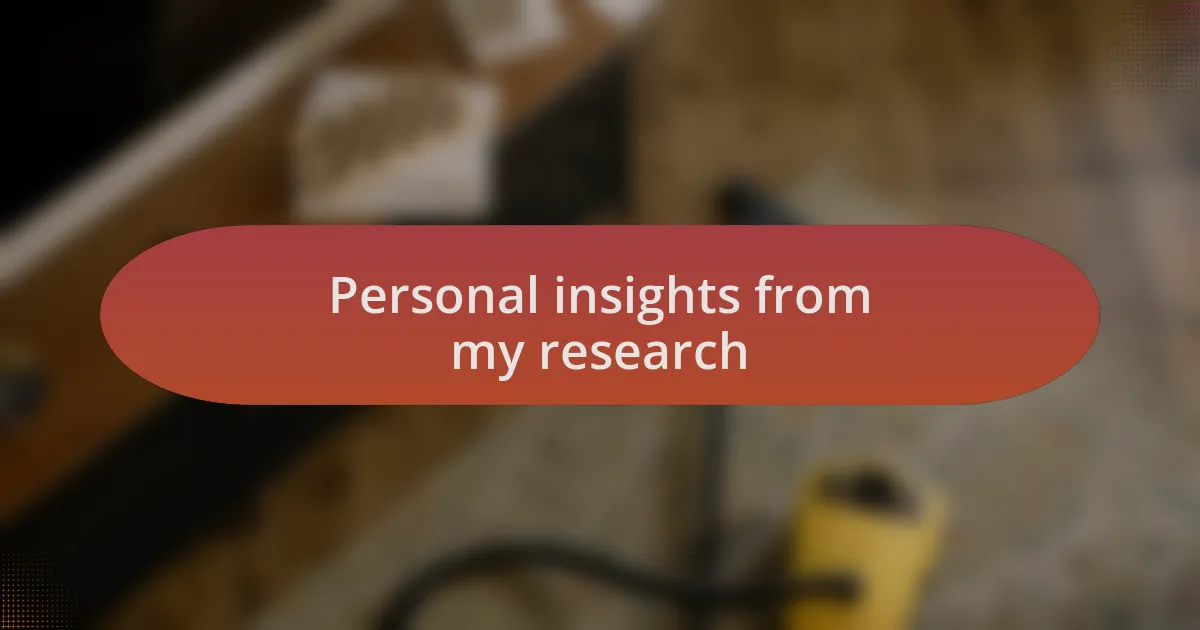
Personal insights from my research
As I delved deeper into my research on wills, I discovered the profound stories hidden within these seemingly straightforward documents. One particular will started as a baffling puzzle but transformed into an intimate glimpse into my great-uncle’s life. His specific requests for his prized vinyl records sparked a flood of nostalgia, reminding me of the countless afternoons spent listening to music with him. How often do we overlook these personal touches that reveal much about our loved ones?
A surprising insight I encountered was how wills can serve as a reflection of unresolved family issues. In one case, my aunt’s will hinted at an estranged relationship with a cousin through its careful distribution of assets. This left me pondering: could a simple document like a will provide clues about familial rifts that remain unspoken? It was a humbling reminder that while we chase after names and dates in our genealogy, emotional legacies often linger just beneath the surface.
Throughout my exploration, I appreciated the connections that emerged not just from names on a page but from the emotions and relationships they encapsulate. One will included a heartfelt letter addressed to the family, expressing regret and love in equal measure. Reading those words felt like an invitation to embrace the complexities of family dynamics. It made me wonder, do we truly understand the weight our words carry? By examining these documents with a personal touch, I found a deeper connection to my heritage that transcends mere facts and figures.